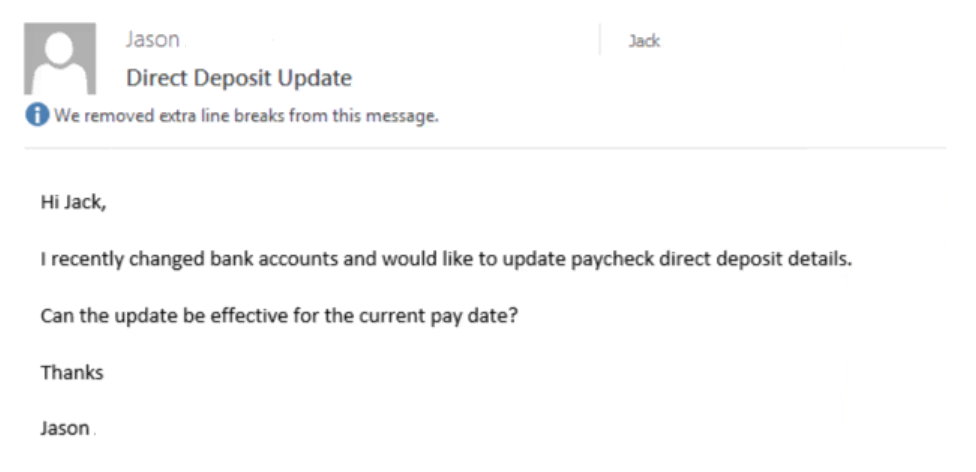Last Minute Tax Planning Change
Last Friday, December, 19, 2014, the President signed into law the “Tax Increase Prevention Act of 2014.” This Act contains last minute, retroactive...
In December of last year, the Internal Revenue Service warned tax professionals of an increase in phishing emails that involved payroll direct deposit and wire transfer scams. In recent months, these fraudsters have been targeting human resource personnel convincing them to reroute an employee’s paycheck by direct deposit.
The emails look legitimate at first and generally impersonate a company employee, often a CEO or CFO. The email from the “employee” asks the payroll or HR staff to change his or her direct deposit for payroll purposes. The “employee” provides a new bank account and routing number, usually to an offshore account, all controlled by the scammer.

Example: the emails are meant to be simple and direct, with few misspellings or grammatical errors that would trigger email filters.
Once routed to the thief’s account, the company is on the hook for replacing the victim’s stolen funds and the employee now faces the inconvenience of a late paycheck, or two.
These types of scams come in many forms such as fake invoice payments, title escrow payments, wire transfers and other schemes that result in a quick payoff for the thief. Businesses should be on high alert and carefully review all incoming emails, even those from company employees, before taking action. We strongly advise businesses to consider policy changes to guard against such losses.
Thousands of people have lost millions of dollars and their personal information to scammers. Stay alert! The IRS warns consumers of such scams. Please visit the IRS Tax Scams / Consumer Alerts page.
Last Friday, December, 19, 2014, the President signed into law the “Tax Increase Prevention Act of 2014.” This Act contains last minute, retroactive...

1 min read
The U.s. department of labor recently issued an update bulletin rescinding prior guidance known as the "80/20 rule". Since 2009, this...
Happy New Year! All of the guests have returned home, the holiday decorations are taken down and packed away, the hustle and bustle of the holiday...